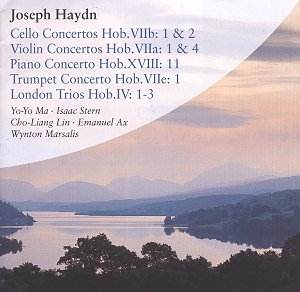Something of a mixed bag here starting, ominously and
yet inevitably, with Sony’s packaging. This company usually manages
to annoy me by omitting all recording details but here they surpass
themselves because they’ve managed entirely to omit the names of the
musicians who play the three London trios. A small matter really as
they’re only Isaac Stern, Mstislav Rostropovich and Jean-Pierre Rampal.
Never mind, once past this typographical omission and we’re faced with
a dazzling array of soloists only some of whom live up to their billing.
So to present the conclusion first it’s in with Yo-Yo Ma, Emanuel Ax
and Cho-Liang Lin and the stellar chamber trio so thoughtlessly omitted
from the booklet and jewel case documentation and it’s farewell to Wynton
Marsalis and Isaac Stern the soloist.
Yo-Yo Ma is an exceptionally sensitive soloist; his
phrasing is romantically orientated but not romanticised. A degree of
self-control and tonal austerity are permanent admixtures of his playing
so that for example the C major emerges as warm but not anachronistically
emotive. The lean tone he employs in the Adagio sounds entirely apt
– and if one can baulk at the recording, most especially in the finale
where there is a degree of unnatural spotlighting – that’s hardly the
soloist’s fault. In the D major his diminuendi are expressive without
becoming excessive; dynamics are restrained and his naturally elegant
phrasing is enormously pleasurable. He doesn’t dig too deeply into the
string and in the slow movement is sympathetic but certainly not sugar
coated. The spirited Allegro finale has some spot-on intonation, considerable
energy and a winning stylishness. Not a brace of performances for those
who crave emotive espressivo from their Haydn but to me more
than merely efficient; these are readings more than deserving of a welcome
back to the catalogue. Emanuel Ax is predictably splendid in the keyboard
concerto; left hand stabbing away in the opening Vivace as he himself
directs the Franz Liszt Chamber Orchestra. There’s plenty of fluency
here and in his own cadenza, properly glittering, he creates an atmosphere
around him of energy and skill. The limpidity and grace of the slow
movement is delightful and the famous Rondo all’Ungarese finale is dextrous,
taut and witty without ever resorting to bombast – a splendid traversal
all round.
The same goes for Cho-Liang Lin’s performance of the
First Violin Concerto. In keeping with his equally recommendable Mozart
Concertos he is a most stylish exponent of this repertoire. The basses
are well defined here, the harpsichord is well heard in the balance
and Lin is expressive within the stylistic boundaries of the piece.
His slow movement is done with real simplicity and elegance. After which
Stern comes as something of a disappointment in the G major Concerto,
in particular the first movement. His intonation is worryingly approximate
in the first movement cadenza and the sense of technical strain becomes
increasingly uncomfortable. Best to pass over this. And also, for different
reasons, Marsalis’s Trumpet Concerto, a gauche and unattractive reading.
I liked the prominence of the flutes in the orchestral passages in the
first movement – Leppard on attentive and intelligent form – but Marsalis
is anodyne for much of the movement and more crucially in the Andante.
He launches a remarkable technique in the third but facelessness bedevils
the performance. The little London trios reassert some last minute strength;
the trio of Rampal, Stern and Rostropovich enjoy the simplicities of
these undemanding works but no one will buy the discs for these performances
alone.
As I said, a mixed bag. A better proposition, theoretically,
would be to detach the Stern, Marsalis and the trios to leave Yo-Yo
Ma, Cho-Liang Lin and Ax - but this would breach the 80-minute mark.
So as it stands a recommendation with some serious reservations.
Jonathan Woolf

